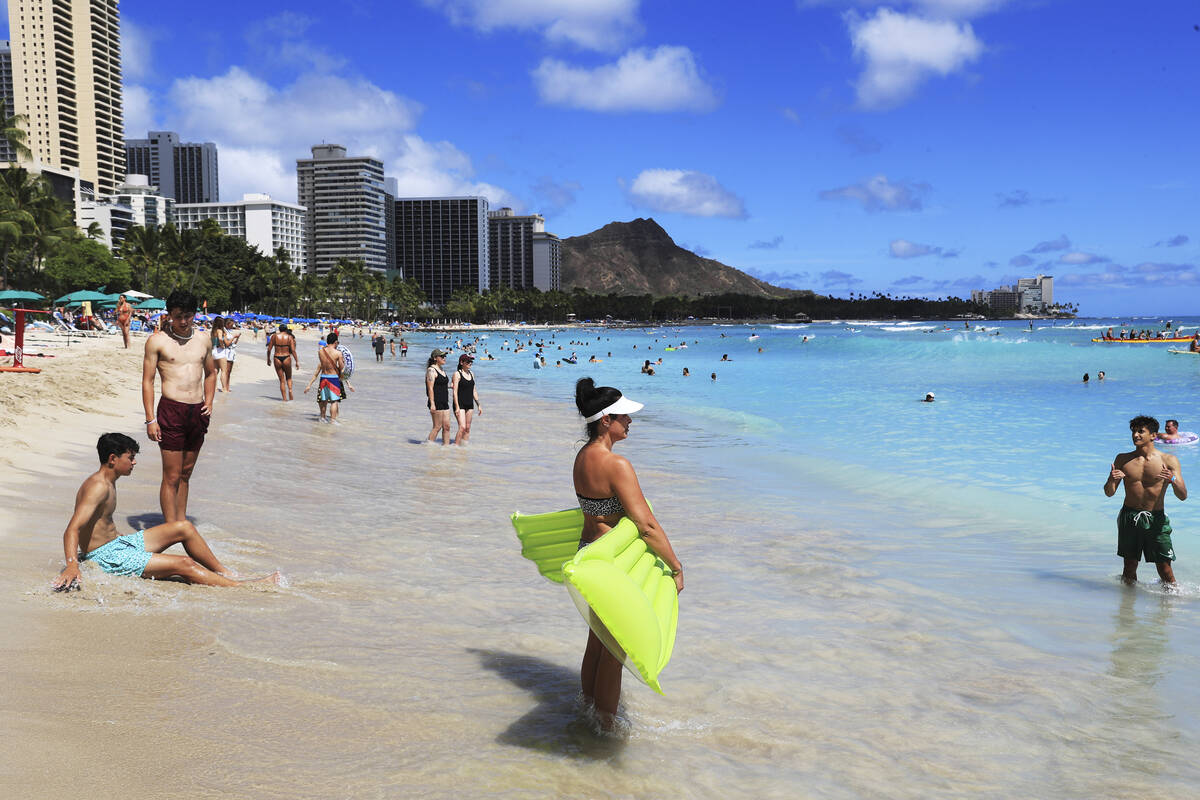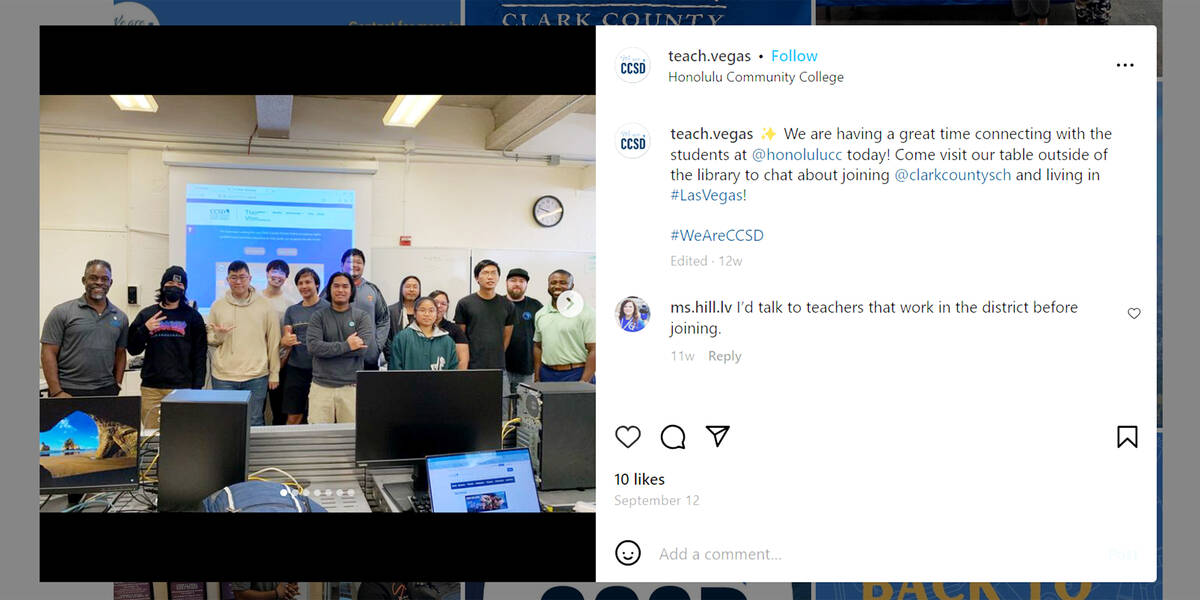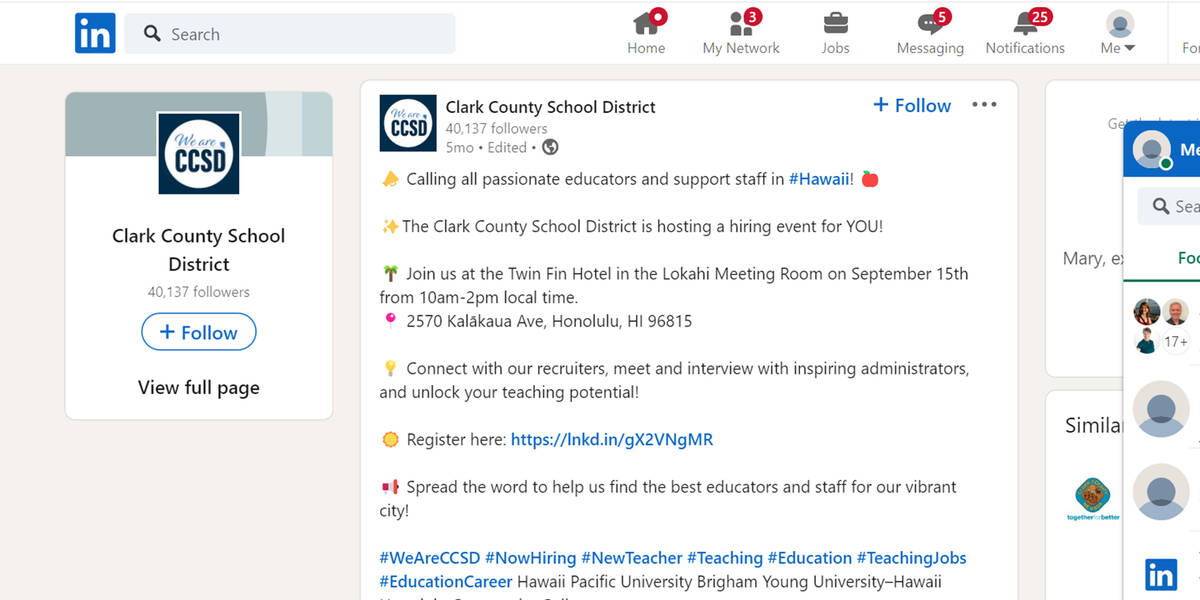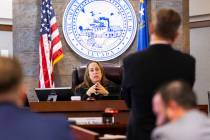CCSD recruitment trips to vacation spots under state, federal investigation



The U.S. and Nevada departments of education are probing the use of federal pandemic aid by the Clark County School District to send large groups of staff to beach vacation destinations for teacher recruitment, according to a state education official.
The district for Las Vegas Valley schools sent 17 staff and school principals to Miami Beach over the Fourth of July holiday at a cost of about $37,000, as first reported by the Review-Journal. Federal dollars paid $29,000 of the cost, documents obtained through a public records request show.
Two half-day hiring events in a small conference room at their beachfront hotel during their five-day stay attracted two candidates and resulted in no hires, the district acknowledged.
Using federal funds, the district in September also sent eight staff, administrators and a principal to Honolulu for a five-day stay on Waikiki Beach as a recruitment trip.
Asked whether these trips were being investigated, the Nevada Department of Education responded that it is “currently working with the United States Department of Education (USED) to evaluate the use of these funds.”
Sandy Julian, spokeswoman for the state agency, wrote in an email that it provided its findings on the use of the funds to its federal counterpart on Tuesday. She did not specify what these findings were in the email sent Thursday afternoon.
In an email Friday afternoon, the district stressed that the state Education Department had approved in advance using the federal funds for these trips “as reasonable, allowable, and allocable expenses.”
Waikiki Beach trip
In September, a group of eight CCSD staffers, administrators and a school principal flew to Hawaii to find, as a district social media post put it, “the best educators and staff for our vibrant city” of Las Vegas.
The group traveled to Honolulu, where members held a half-day recruitment event in a small conference room at their hotel on Waikiki Beach, public records obtained last week show. During the five-day trip, members also were scheduled to speak to students and teachers at two universities and a community college, a trip itinerary shows.
Three job candidates attended the half-day event, said interim Chief Human Resources Officer Cedric Cole.
“At this point in time three candidates are proceeding through our hiring process,” he wrote in response to a Review-Journal question.
A review of expense reports shows that the trip cost more than $22,000 for flights, food, lodging and other travel expenses, excluding salaries.
Six of the eight travelers extended their stay a day at their own expense, records show.
The September trip was the second last year to Honolulu by district recruiters, records show. The first was taken in February 2023 by two recruiters at a cost of $4,600. During that trip, the recruiters were scheduled to speak at the same two universities visited in September — Hawaii Pacific University and Brigham Young University-Hawaii.
Like the September Miami Beach trip, the Waikiki Beach trip was primarily funded with federal Elementary and Secondary School Emergency Relief Fund tax dollars.
“It’s very troubling to see that funding to directly support students is being used to support basically taxpayer-funded junkets to beach locations,” Demian Brady, vice president of research for the National Taxpayers Union Foundation, said this week after the Review-Journal described the trips.
He questioned the district’s failure to “show results of this in terms of bringing in new teachers to help the kids.”
Brady said the funds were intended to help schools with the setbacks brought on by the pandemic. The money was primarily supposed to support programs to bolster student mental health harmed by lockdowns and school shutdowns and to provide students with additional learning opportunities, such as extended-day and summer programs.
The grant program provides flexibility in how its dollars are spent, and among many other uses, the money can be used to “strengthen recruitment and training programs,” according to information from the federal Education Department.
‘Doesn’t pass the smell test’
Every dollar should have been used to improve the loss of learning experienced during the pandemic, said John Vellardita, executive director of the Clark County Education Association. Instead, the head of the local teachers union said, these two recruitment trips had “zero effect on students.”
This spending “doesn’t pass the smell test,” he said. “It looks like self-serving trips for district employees to bask on beaches during holidays.”
The teachers union has called for the firing of CCSD Superintendent Jesus Jara on numerous grounds. The Clark County School Board is scheduled to consider Jara’s resignation or termination Wednesday.
In emails, the school district said the Nevada Department of Education had approved its plan to use federal money to pay for recruitment trips to “major metropolitan areas … to conduct job fairs to recruit educators to come and teach in Clark County School District.”
The district’s plan states, “The COVID-19 pandemic had a critical negative impact on education staffing, leaving Clark County with an even higher vacancy rate than it was already experiencing prior to the pandemic.”
Julian wrote in an email, “In an effort to refine and improve the ESSER allocation process, the Nevada Department of Education is currently evaluating the criteria and allowability requirements for ESSER funding requests of this nature.”
Citing district policy, School Board trustees have referred questions about recruitment travel to the district communications office or board President Evelyn Morales Garcia, who has not responded to requests for comment.
‘This is shameless’
A Facebook group for parents with children in CCSD schools reacted with outrage when a member in December posted the Review-Journal’s story about the Miami Beach trip.
“This is shameless,” one member wrote.
“Apparently I’m in the wrong position in the district as I work teaching every day and don’t have enough money for groceries for my kids,” wrote another. “I would love a trip to Miami Beach.”
One member, who said she was the roommate of a CCSD recruiter, defended the trip by saying the district had to use the federal funds or lose them. Other members took issue with this defense.
“Can you really not think of a better way to spend the funds?” group member Alexandra Erbisch-Westcott wrote in a post.
“CCSD is bleeding teachers,” Erbisch-Westcott, a kindergarten teacher with two children in district schools, said in an interview in December. She said she would like to have seen the money spent instead on mentoring programs for new teachers, but that returning the federal grant would have been preferable to how it was spent.
“If it’s spend $37,000 on a beach vacation or let it expire, let it expire,” she said.
From mid-September 2022 to mid-November 2023, the district spent about $240,000 on travel expenses for 60 recruitment trips. In November, the district said that it could not say how many hires had resulted from recruitment trips, citing inadequate tracking systems for trips.
However, in January, the district said that 173 hires had resulted from recruitment events from early August through early November of last year.
Contact Mary Hynes at mhynes@reviewjournal.com. Follow @MaryHynes1 on X. Hynes is a member of the Review-Journal’s investigative team, focusing on reporting that holds leaders and agencies accountable and exposes wrongdoing.
























